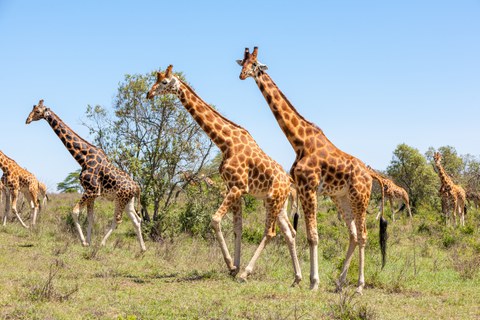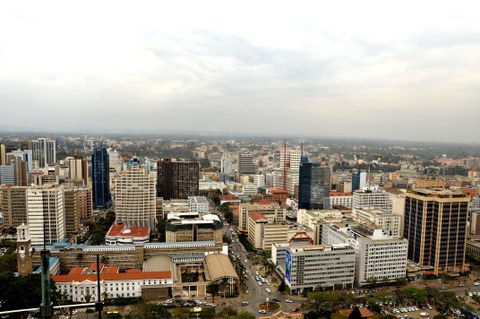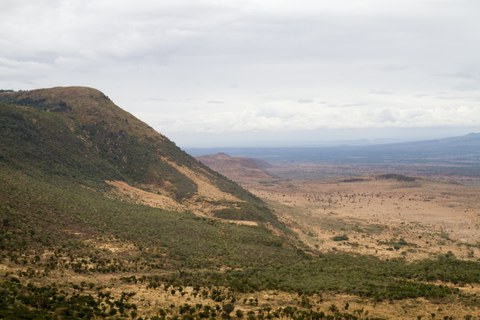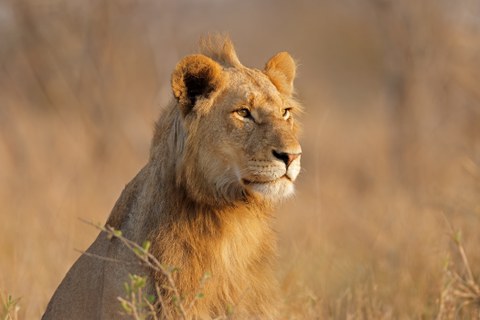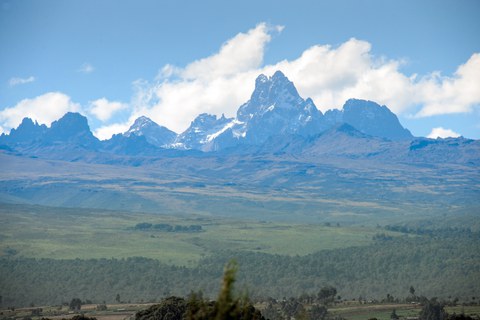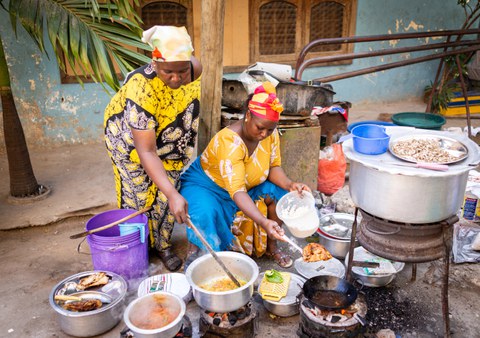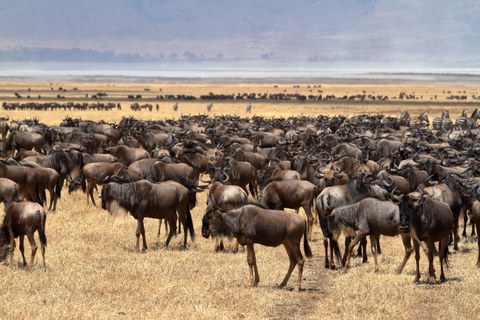Partner Country of the Month July 2024: Kenya
Karibu Kenya, welcome to Kenya! The country on the coast of East Africa is known for its great nature and wildlife. Lions, elephants and co. roam the savannah in the numerous national parks and reserves. There is also a new TU partner university in Kenya - the second on the African continent. You won't find the typical Erasmus party life here, instead you can immerse yourself completely in everyday life in Kenya, with hospitable people and a wild mix of modernity and tradition.
With the "Partner Country of the Month" campaign, we want to shine a spotlight on the wide diversity of countries, regions and partner universities of TU Dresden that our students can explore during a semester abroad.
Table of contents
General facts and figures about Kenya
Capital: Nairobi
Population: 51.5 million
Official language: Swahili and English
National holiday: Jamhuri Day on December 12 (Republic Day)
Currency: Kenyan shilling (KSh or Sh for short)
You can find more facts, figures and information on Wikipedia, at DAAD country information, on the website of the Federal Foreign Office or at wikivoyage, for example.
Language matters: Swahili
- Hello - Jambo
- How are you? - Habari gani? Answer: Good - nzuri
- What's your name - Jina lako ni nani?
- Take it easy - Pole pole
- Okay - Sawa
- Please / welcome - Karibu
- (Thank you - Asante (sana)
- Goodbye - Kwa heri (to one person) / Kwa herini (to several)
Kenya is a multilingual country. As in most of Africa, the national borders drawn during colonial times do not correspond to cultural and linguistic borders. Every Kenyan belongs to one of over 40 tribes that have their own territories, customs and languages. Swahili is mostly used as a lingua franca between people of different ethnic backgrounds.
Swahili (also known as Kiswahili) belongs to the Bantu language family, which is the most widely spoken language in sub-Saharan Africa. It originally comes from the coast of East Africa and is now spoken by around 200 million people, mostly as a second language. This makes it the largest of Africa's more than 2,000 languages. Swahili is one of the first African languages for which language technology applications such as spell checking and machine translation were developed.
English is mostly used for official purposes in Kenya, including at universities. The courses at our partner university are taught entirely in English, so you can study in Kenya without any knowledge of Swahili. At TUDIAS, you can polish up your English, e.g. in the course to prepare for stays abroad.
Learning some Swahili is of course still a good idea and will give you a big sympathy bonus. You already know a few words, e.g. safari (travel) or jenga (build). There are some online resources for Swahili, e.g. Kiswahili-Kurs.com (free) or Swahilipod101 (relatively cheap).
Did you know that ....?
- Kenya dominates Olympic middle and long-distance running? Kenyan athletes regularly come out on top. In the men's steeplechase, Kenya even won all gold medals from 1984 to 2016, nine Olympics in a row! The majority of runners belong to the Kalenjin tribe, who are often remarkably tall and slim - good physical conditions. The high altitude of their home in western Kenya provides perfect training conditions. And last but not least, running is a rare career option alongside farming.
- Nairobi is the only capital city in the world with a national park? The city skyline can be seen against the backdrop of the savannah landscape of Nairobi National Park, which begins just seven kilometers from the city center. Although the park is comparatively small, it contains a wide variety of wildlife and is particularly famous for lions and rhinos. Unfortunately, the expanding city also poses a threat to the animals' habitat.
-
Kenya generates over 70% of its electricity from renewable energy sources? Hydropower and geothermal energy are the main sources. Kenya's location on the East African Rift Valley is very favorable for the latter, as the drifting apart of the tectonic plates can supply virtually unlimited energy. Kenya is also home to Africa's largest wind farm. Where there is no connection to the electricity grid, green solutions are also being used - mobile solar panels are widespread.
- religion plays an important role in everyday life in Kenya? Around 85% of the population is Christian - regular church attendance is a matter of course. Islam is also widespread, especially in the coastal regions, with around 10%. Traditional African spirituality is strongest among the ethnic groups that have retained their traditional way of life, or in mixed form with Christianity.
-
Kenya may not exist for much longer? The country is part of the East African Community, an economic organization now made up of eight countries that are striving to merge into a single state in the long term. The planned East African Federation would be one of the largest countries in the world: the seventh largest in terms of area and third behind China and India in terms of population.
-
Hakuna matata from "The Lion King" comes from a Kenyan tour guide? The film crew traveled to Kenya in 1991 to be inspired by the landscape and wildlife and picked up the Swahili phrase there. Hakuna matata (no worries / problems) is often used to reassure tourists that they are in a safe place in Kenya. Many names in The Lion King are also Swahili words, e.g. simba (lion), pumbaa (naive, silly) and rafiki (friend).
Cooperation with universities in Kenya
You can find all cooperations of TU Dresden in our database. Have a look at the experiences of our previous exchange students at Questionnaires. Professors at your faculty may have direct contacts to your partner university of choice and can advise you.
Our Kenyan partner university: University of Embu
- Interdisciplinary cooperation via TUDworldwide
- The University of Embu is a great choice if you want to get very close to a different culture and make lots of local contacts during your semester abroad. Foreign students are the exception. The halls of residence, canteen, lecture halls and the meeting points for various sports and leisure groups are located right next to each other on the campus just outside the city. Perfect for a lively student life with few barriers between you and the Kenyans.
- Embu is located on the slopes of the Mount Kenya mountain range, after which the country is named. Around 65,000 people live in the provincial capital of Embu County, the territory of the Aembu tribe. However, the university's students come from all corners of Kenya. Anyone who thinks that it is always hot in Africa is mistaken - the average temperature in Embu is a pleasant 20°C all year round. The city is known for its jacaranda trees, which produce a sea of purple flowers in the fall.
Don't miss...
Mount Kenya National Park. The second highest mountain massif in Africa is located very close to our twin city. Only 20 km from the equator, the extinct volcano rises 5,199 m into the air, the highest peaks are covered by snow and glaciers. This has created a unique flora on the flanks of the mountain, including mist and bamboo forests. You can climb the mountain in a multi-day tour, but if you have less money or fitness reserves, day trips are also worthwhile, e.g. at Castle Forest Lodge (a guide is necessary due to the wild animals).
In the women's village of Umoja , men are only allowed to visit. The village was founded by women from the Samburu people who were fleeing violence or forced marriage in their villages. Today it is a place of refuge, a center for women's rights activism and a good place to learn more about Samburu culture. The women offer tours of their village, perform traditional dances and sell colorful handmade glass bead jewelry.
Markets and street food. Small stalls are a dime a dozen in Kenya and there is plenty to discover, from nyama choma (grilled meat) to viazi karai (spicy fried potatoes) and samosas (dumplings of Indian origin, but with an African touch). The fresh fruit is also very tasty, e.g. mango with chili salt, bananas, pineapple or coconuts.
National park safari. With more than 40 national parks and reserves, there is no shortage of opportunities in Kenya to see the fascinating African wildlife up close. Particularly popular is the Masai Mara, where the annual migration of millions of wildebeest and hundreds of thousands of zebra and antelope takes place. Which park to visit is also a question of price and preference - going in the low season is worthwhile.
Let's cook...
Kenyan dishes are often not necessarily typical for Kenya, but for the whole of East Africa. Nevertheless, there are many regional differences - also because the people are mostly self-sufficient. In areas with fertile farmland, there are lots of fresh vegetables on the menu. In the dry north of the country, on the other hand, which is better suited to livestock farming, there is more meat on the table. In the richer coastal region, the ingredients and dishes are particularly varied.
Ugali is at the heart of Kenyan cuisine. This solid porridge made from maize flour is the number one staple food and, when kneaded, also serves as a spoon for the side dishes, as people usually eat with their (well-washed) hands. Typical side dishes for ugali include bean stew, potato-pea-corn porridge or cabbage.
Maharage ya nazi (kidney beans in coconut milk)
This hearty bean stew is a typical dish from the East African coast. Over the centuries, the Swahili people living here have maintained lively trade relations with Arabia and India, which is reflected in the spices. The use of coconut (nazi) is also common, especially on the coast. The stew is served with rice, ugali or chapati flatbread.
Ingredients:
- 500 g tinned kidney beans
- 1 onion
- 2 cloves of garlic
- small piece of ginger (approx. 1 cm) or 1 tsp ginger paste
-
1 tbsp oil
- 1 tsp salt
- 120 ml strained tomatoes
- 240 ml coconut milk
- 300-400 ml water
- ½ tsp turmeric
- 1 tsp coriander (powder)
- ½ tsp pepper
- 2-3 tsp fresh coriander greens
Preparation:
- Drain the water from the tin of kidney beans.
- Finely chop the onion and the piece of ginger and crush the garlic cloves.
- Heat the oil in a pan over a medium heat. Add the chopped onion and fry, stirring, until soft and translucent.
- Add the ginger and garlic and fry for a few seconds. Add the spices (except the coriander) and tomato purée. Cook until the tomato purée is thick and no longer watery.
- Add the salt and beans. Stir well. Add 1 cup of water and simmer the beans for 5 minutes.
- Pour in the coconut milk and simmer the maharage for another 5 minutes.
- Add chopped coriander, mix well and serve hot. Ufurahie chakula chako!
(Many thanks to mayuris-jikoni.com!)
Contact
Have you had a great time in Kenya? Do you have tips for places and experiences that are not to be missed? We would be happy to share your experiences here, on social media or, if you want, in information events for other TUD students. Get in touch with us:
 © Sven Ellger/TUD
© Sven Ellger/TUD
Advice on studying abroad
NameMs Federica Serra
Infocenter/ Study abroad; TUDworldwide: America
Send encrypted email via the SecureMail portal (for TUD external users only).
Visiting address:
Fritz Foerster Bau, Office 161 Mommsenstraße 6
01069 Dresden
Postal address:
TUD Dresden University of Technology International Office
01062 Dresden
Office hours:
- Tuesday:
- 09:30 - 11:30
- 12:30 - 14:30
- Thursday:
- 09:30 - 11:30
Please register at the SCS (FOE, floor 0).
Looking for first-hand information?
Would you like to know more about Kenya? Ask our alumni ambassadors - TUD alumni who are active in many countries around the world and can give you information and advice for your stay abroad.
Getting in touch is very easy: On this interactive world map, markers indicate the cities where our alumni ambassadors live. There is a short profile with contact information for each ambassador.
Partner country archive
Did you miss a partner country? No problem! Here you can read up on all articles.
|
Europe (Erasmus+) |
|
|
Africa |
|
|
America |
|
|
Asia |
|
|
Australia and Oceania |
|

